Reflecting on the Critical Intersections Webinar
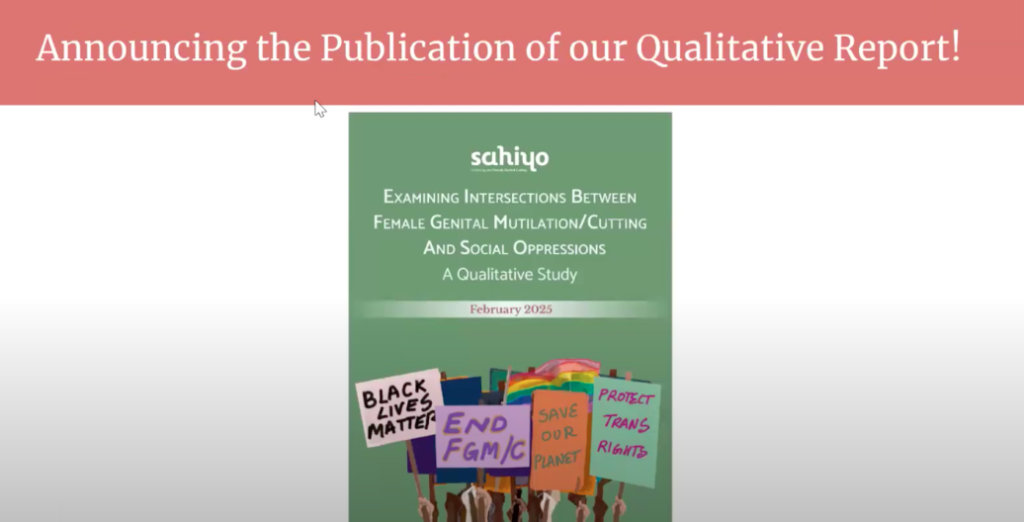
On February 27th, Sahiyo’s Research Coordinator Rachel Wine, and Executive Director Mariya Taher led the webinar, “Intersectional Approaches Strengthen Alliances and Build Movements to End FGM/C,” to announce the publication of the third and final report for Sahiyo’s Critical Intersections Research Project project, Examining Intersections Between Female Genital Mutilation/Cutting and Social Oppressions: A Qualitative Study. The event explored Sahiyo’s Critical Intersections Research Project from its inception in 2021 to the present in 2025. Mariya shared how a 2021 webinar focused on how racism impacted the movement to end FGM/C inspired the Critical Intersections research project. While, Rachel gave an overview of the findings from our first two reports: Examining the Current State of Critical Intersections: Female Genital Mutilation/ Cutting and Social Oppressions Examining Intersections Between Female Genital Mutilation/Cutting and Social Oppressions A Mixed Methods Study Throughout the course of this three-year project, many researchers supported the work and they too shared their experiences during the webinar with partner researcher Naquia highlighting the key intersections found in this newest report: race/racism, LGBTQIA+ issues, gender inequities, and religious discrimination. Another partner researcher Jessica Puri and Project Advisors Aarefa Johari and Saza Faradilla spoke about their experiences with intersectionality in their own work surrounding FGM/C, and how the findings from the report can strengthen the movement to end FGM/C. In specific, Aarefa discussed how religion intersects with FGM/C in India, and Saza touched on the benefits of framing FGM/C through the lens of gender to recognize FGM/C is a form of gender-based violence. Naquia spoke to the framing aspect and asked readers of the report to consider the importance of language and the complex nature of FGM/C when engaging in activism to end it Rachel ended the webinar, by uplifting the four recommendations from the report: To coordinate with social service sectors across various social justice issues Improve language and framing of FGM/C Increase education on how FGM/C is intersectional Implement more diverse and equitable approaches to data collection, analysis, and dissemination Each recommendation was accompanied by a suggested action item for those in the FGM/C sphere to help them incorporate intersectionality into their approaches and advocacy. As the anti-FGM/C field looks to the future of their work, the Critical Intersections Research Project makes it clear that intersectional collaboration is crucial to creating social change and ending this human rights violation. Watch the webinar recording here. Learn more about the Critical Intersections Research Project here.
Reflecting on “Storytelling as a Tool for Female Genital Mutilation/ Cutting (FGM/C) Survivor-Centered Change” at CSW 69
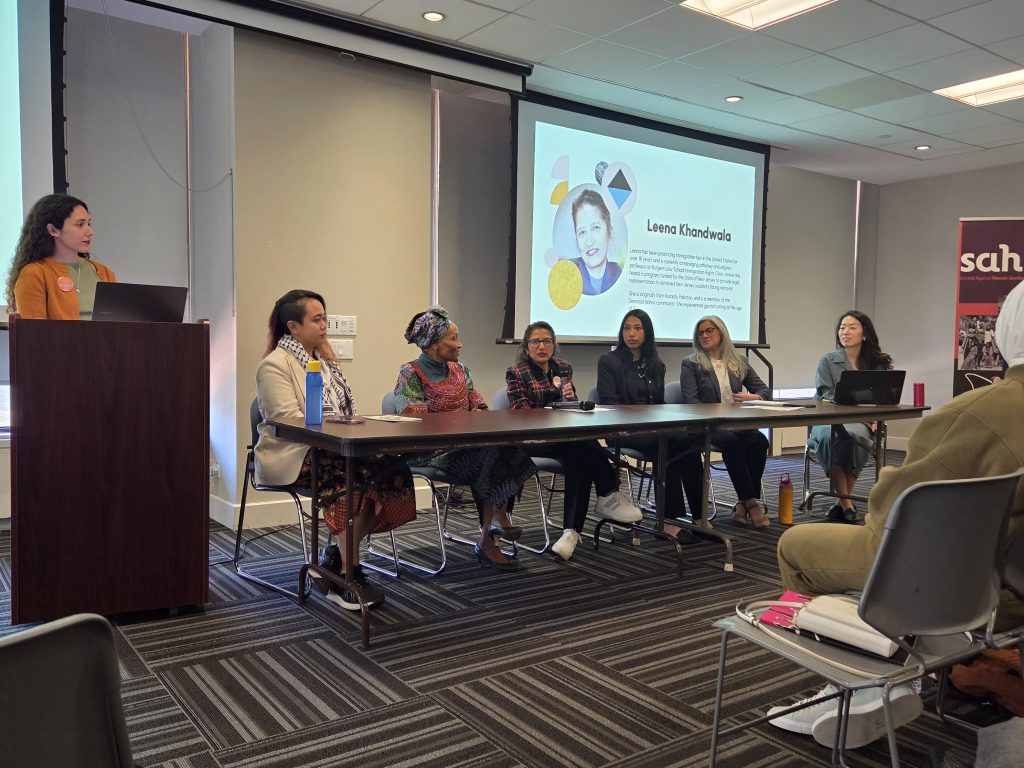
On March 18, 2025, Sahiyo co-hosted a powerful parallel session during the 69th Commission on the Status of Women titled “Storytelling as a Tool for FGM/C Survivor-Centered Change.” Organized in partnership with the Voices to End FGM/C program collaborators—Silence Speaks and the Asian Women’s Shelter—the event took place at the Church Center for the United Nations in New York. The event highlighted the experiences and powerful narratives of survivors and advocates, exploring storytelling as an effective method to foster understanding and drive social change. The session was facilitated by Sahiyo co-founder and Executive Director Mariya Taher and moderated by Su Young from the Asian Women’s Shelter. Speakers included Zehra Patwa, Dena Igusti, Saza Faradilla, Leena Khandwala, and Angela Peabody, each offering unique perspectives and deeply personal experiences to the conversation. During the panel, two of the storytellers, Zehra and Leena, reflected on the renewed and unexpected emotions they felt while watching their digital stories again. As participants in Sahiyo’s inaugural Voices to End FGM/C workshop (formerly called Sahiyo Stories), it had been a long time since they’d both viewed their stories, particularly in a public setting. This moment reminded us how powerful and vulnerable storytelling can be—even long after the initial release of the stories. As members of the Dawoodi Bohra community, both Zehra and Leena spoke about the resistance they’ve faced for addressing FGM/C openly. Still, they each shared how, at different moments in their journeys, speaking out has not only empowered them personally but has also helped spark dialogue and awareness within their families and broader social circles. Another impactful moment was the discussion around language. Saza, who recorded her story in Bahasa Melayu, shared that although she doesn’t feel especially fluent in her community’s native tongue, she felt strongly that it was important to tell her story in that language. For her, doing so was a way to reach members of her own community in Singapore and the broader diaspora. She expressed hope that her story might resonate with communities in Malaysia, Indonesia, and Brunei, where similar experiences are generally underrepresented, and oftentimes never even spoken of. Angela also shared a deeply personal reflection. Though not a survivor herself, she spoke about how creating her digital story during the workshop marked the first time she talked openly about what happened to her childhood friend who underwent FGM/C. She recalled seeing her friend again two years after she went into the Greibo bush and wondering why she no longer wanted to play with her. Angela’s story was a powerful reminder of how FGM/C can impact not only those who experience it directly but also those around them. Dena, a trans-nonbinary survivor of FGM/C, spoke openly about the internal struggles they faced while developing their digital story. They described grappling with feelings of not being “trans enough,” or even “a survivor enough.” Their vulnerability in naming these feelings brought attention to the nuanced layers of identity, belonging, and validation that many look for when deciding to share their stories publicly. Many attendees were excited and expressed a desire to see more of the digital stories and learn from Sahiyo’s storytelling model. We’re hopeful that these conversations will lead to new partnerships and expanded opportunities to support survivors in sharing their experiences, on their own terms and in their own voices. Visit our Voices to End FGM/C website to learn more!
Positive Masculinity; A Critical Tool in the Movement to End FGM/C

By Brad Mazon, PhD. Brad is a Bhaiyo volunteer, nonprofit consultant, husband, father, and an advocate against female genital mutilation/cutting worldwide. I had the opportunity to attend two webinars sponsored by the Men End FGM Foundation entitled “Power of Prevention: Harnessing Positive Masculinity to Combat Violence Against Women and Girls.” The title of the webinar itself indicates that masculinity, and its implementation, can be negative or toxic. During the webinar, I almost came to think of “masculinity” as a verb, given its ability to exert either a positive or negative influence on the lives of others. The term “toxic masculinity” was mentioned throughout the webinar, as folks chimed in about the need to redefine masculinity. Toxic masculinity is the idea that to be masculine is to be inherently oppressive and controlling. “Positive masculinity” was another frequently invoked term, defined as being empathic, emotionally intelligent, and honest with one’s feelings. Toxic masculinity not only affects women but men as well. Think of all of the ways that men suffer from toxic masculinity, including how it defines their life choices, decisions about a mate, how they interact with all genders, how they dress, the music they listen to or not, whether they cry or not, and even how they perceive themselves. As a gay man, I’ve recognized how American society’s notion of masculinity has influenced my path. The webinar reinforced, yet again, how masculinity is defined directly impacts all people, no matter what your gender is. Dr. Jacqueline Chesang spoke of how it takes years to change social and gender norms. She emphasized that a whole community approach is needed so that the perspectives of men and boys are included because men can also be barriers to change if you don’t engage with them. Dr. Chesang continued by saying that men can advocate and act as role models for anti-GBV efforts and that they can share stories of standing up to norms that harm women. Dr. Chesang also emphasized that we must not exclude men in the work to end gender-based violence. If we do, the existing discriminatory power structure will be reinforced. It made me reflect upon my Midwest fraternity days, when “little sister” parties were held with nearby sororities, but had nothing to do with being “big brothers,” and everything to do with consuming alcohol and hooking up. I’ve seen positive shifts in gender norms over time, but I also know that patriarchy continues to influence women and girls in ways that even they have assumed are “normal” or “acceptable.” Dr. Patrick Muia Ndavi, the Coordinator for Abandonment of FGM for the Africa Center in the Department of Obstetrics at the University of Nairobi, talked about how important it is to understand power dynamics when discussing FGC. He said that a charismatic village elder is needed to help to promote gender equality. Dr. Ndavi addressed various types of power, including skill or expert power, charismatic power, coercive power, and informational power, asking the following questions for us to reflect upon: What is the broader context of power dynamics in the community? Whose opinion matters to everyone in the community? Where does violence manifest itself in the community? Data is needed, he said, to develop and implement strategies to harness male decision-makers to become champions for women and girls. I asked myself where positive masculinity begins. Does it start at home, as one speaker advocated for, at school, or in the media? We are inundated with examples of toxic masculinity, even to the point of admiring the most toxic behaviors in our celebrities, business leaders, tribal elders, and politicians. How can we as societies see beyond gender stereotypes so we can build communities that respect everyone’s contributions, regardless of gender? As the speakers indicated, we have to adopt a multisectoral approach to tackle gender-based violence. The media needs to be engaged to help shape perceptions of masculinity. We can start by teaching boys and girls about gender equality and modeling respectful power dynamics at home. Thinking outside of accepted gender norms takes creativity, the willingness to change, and courage, particularly at the most personal level. Sometimes for change to occur, it also takes an external agent (i.e. legal mechanisms), as we saw recently in The Gambia. To me, positive masculinity is about recognizing and acting on gender equality and respecting the human rights of all in a way that leaves the old, tired, and toxic ways in the dust. Men and women should be equally engaged in this journey. When that happens, there is nothing that we can’t do together to end FGM/C and stop gender-based violence.
Reflection on the Sahiyo Activists Retreat 2024: Zahara Kagalwalla
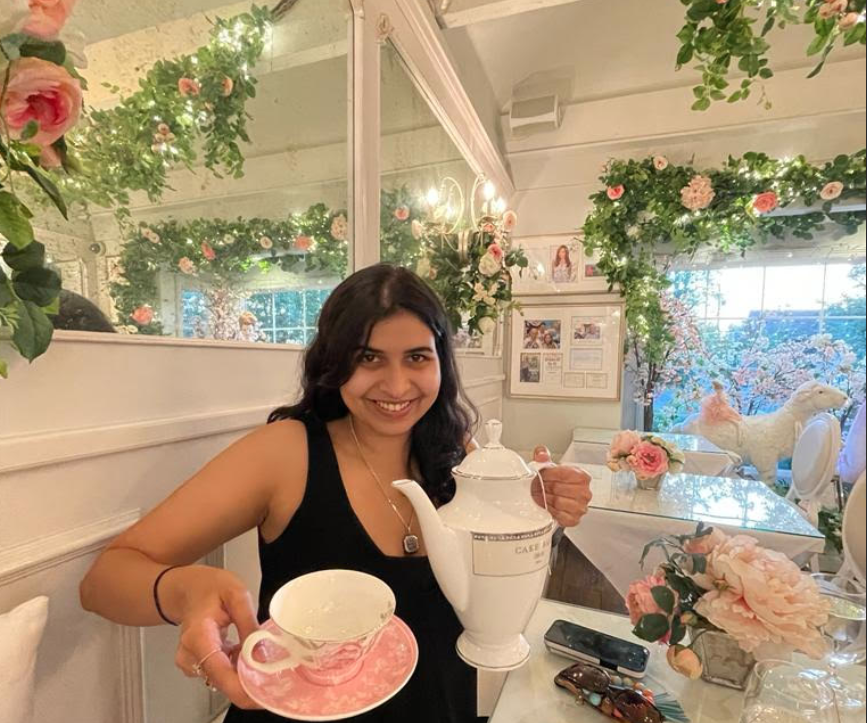
Each year, Sahiyo hosts an annual Activists Retreat to gather anti-FGC activists in a safe and supportive space, where they can engage in meaningful discussions about FGC. These retreats aim to foster collaboration, share insights, and strengthen efforts to eliminate this form of gender-based violence. The retreats include educational programs, self-care activities, and presentations from advocates engaged in anti-FGC advocacy initiatives in their communities. Below, Zahara Kagalwalla, a 2024 retreat participant, reflects on how the experience expanded her community and shares what she’s looking forward to in the next retreat. When I signed up for Sahiyo’s virtual Activist Retreat in the summer of 2024, I expected insightful discussions, but I didn’t anticipate the deep sense of connection that would emerge—even through a screen. The excitement began weeks before the retreat, when a surprise box from Sahiyo arrived at my doorstep, filled with swag, informative materials, and wellness tools—a tangible reminder that I was about to join a powerful community. When I opened the box from Sahiyo, the first thing that caught my eye was a beautifully designed coloring book—an unexpected but powerful reminder that activism isn’t just about policy; it’s also about healing. The retreat was packed with powerful sessions, but a few moments were especially memorable: Hopes for the retreat: Things started with an intimate conversation where we shared our aspirations for the retreat. Some attendees wanted more knowledge on the legal landscape surrounding FGC, while others wanted to tap into the work of other activists to learn how they may advocate against the harmful practice. I loved that we kickstarted the retreat with the topic of intentionality and how we may help each other on our journeys. Reflections from past activists: We had a viewing where we watched reflections from activists who participated in the Voices to End FGC workshop. By hearing these reflections, I was reminded of the power of storytelling in advocacy. Art time: The Sahiyo team sent coloring books and organized a guided coloring activity as a form of self-care. I loved that we could step away for a brief moment from the sometimes heavy discussions and sessions to be in solitude, yet also in the company of this community. This year, I am on the planning committee for Sahiyo’s in-person activist retreat, and I couldn’t be more excited for what’s in store. A few things I’m especially looking forward to are: The Intergenerational Dialogue Workshop: Activist Retreat planning committee members and Sahiyo volunteers, Umme and Nur, are crafting a hands-on workshop focused on how different generations perceive, discuss, and advocate against FGC. I can’t wait to explore ways to bridge generational gaps in these difficult yet crucial conversations. In-Person Connection: Virtual retreats are powerful, but there’s something special about being together in the same space. Past attendees have shared how the best moments often happen after official programming ends—late-night chats and laughter over shared meals. I’m eager to meet fellow activists face-to-face, learn about their journeys, and share pieces of my own.
Legislative Updates: Connecticut Moves Closer to Passing a Bill to Support Survivors of Female Genital Cutting
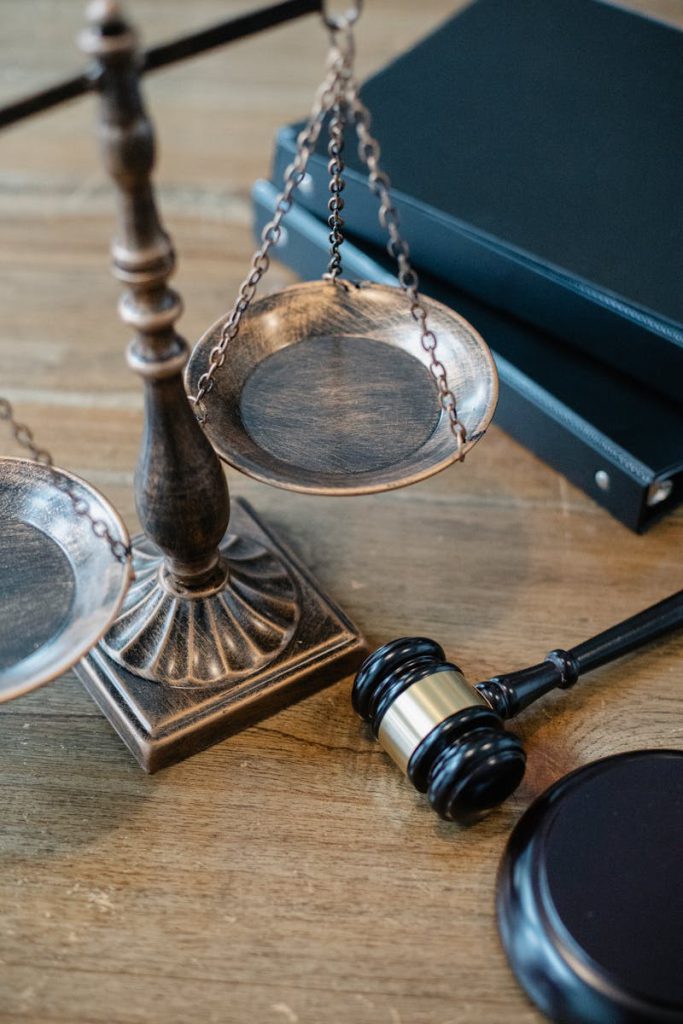
It’s been a busy year so far in Connecticut when it comes to advocating to end female genital cutting, (FGC)! Here are some updates we’d like to share with you all: Legislative Developments On February 4th, in honor of International Day of Zero Tolerance for Female Genital Mutilation/Cutting (FGM/C), State Representative Jillian Gilchrest and State Representative Nicole Klarides-Ditria along with the Connecticut Coalition to End FGMC held a press conference to raise awareness about FGM/C and introduce House Bill 6596: An Act Concerning The Prevention Of Female Genital Mutilation. This proposed bill aims to establish educational programs, provide civil remedies for survivors, and prohibit FGM/C in the state. Connecticut remains one of only nine states without legislation protecting children from FGM/C. Here’s what one of the event speakers, Zehra Patwa, had to say about the press conference: “It was an honor to be invited to share my experience as a survivor at a press conference at the State Capitol on February 4, 2025, in recognition of International Day of Zero Tolerance of FGM/C. Since discovering in my 40s that I was cut as a child, I have worked to ensure no other girls go through what I, and so many other girls in communities who practice FGM/C, went through. I thank Lt Governor Susan Bysiewicz, chair of the Governor’s Council on Women and Girls, and Rep Gillian Gilchrest, along with all the sponsors of bill 6596, who have lent their unwavering support to end this harmful cultural practice on girls in Connecticut. It is comforting to me that this bill has bipartisan support through the tireless efforts of the Coalition to End FGM/C and I beg the House to pass this bill as soon as possible so that not one more girl has to live with the trauma that FGM/C can cause. Because one girl cut is one too many.” The bill has now made its way to the Joint Committee on Judiciary, a crucial step in ensuring legal protections are put in place for FGC survivors and at-risk individuals. Recognizing The International Day of Zero Tolerance for FGM/C Connecticut’s Lieutenant Governor Susan Bysiewicz, a strong advocate for passing legislation on this critical issue of FGM/C, and who also attended and spoke at the Feb 4th Press conference presented, shared with the public that her office had issued a citation recognizing February 6th as International Day of Zero Tolerance for FGM/C. This citation also commended the work of the Connecticut (CT) Coalition to End FGM/C, of which Sahiyo is a founding member, and it acknowledged our coalition’s ongoing advocacy efforts to urge collective action to protect women and girls from FGM/C. The Governor of Connecticut, Ned Lamont, also issued a Proclamation from his office, which Bysiewicz presented to the crowd at the press release as well. Moving Forward Ahead of the public hearing for the Joint Judiciary Committee, date yet to be set, our Coalition is urging Connecticut lawmakers to support passage of House Bill 6596, ensuring that this legislation moves forward into law. We also call on Connecticut residents to join the movement to protect women and girls from FGM/C by signing our Call to Action to urge your Connecticut representatives to sponsor and support this bill.
Join Sahiyo, the Asian Women’s Shelter, and Silence Speaks for a Parallel Event at the 69th Session of Commission on the Status of Women in New York
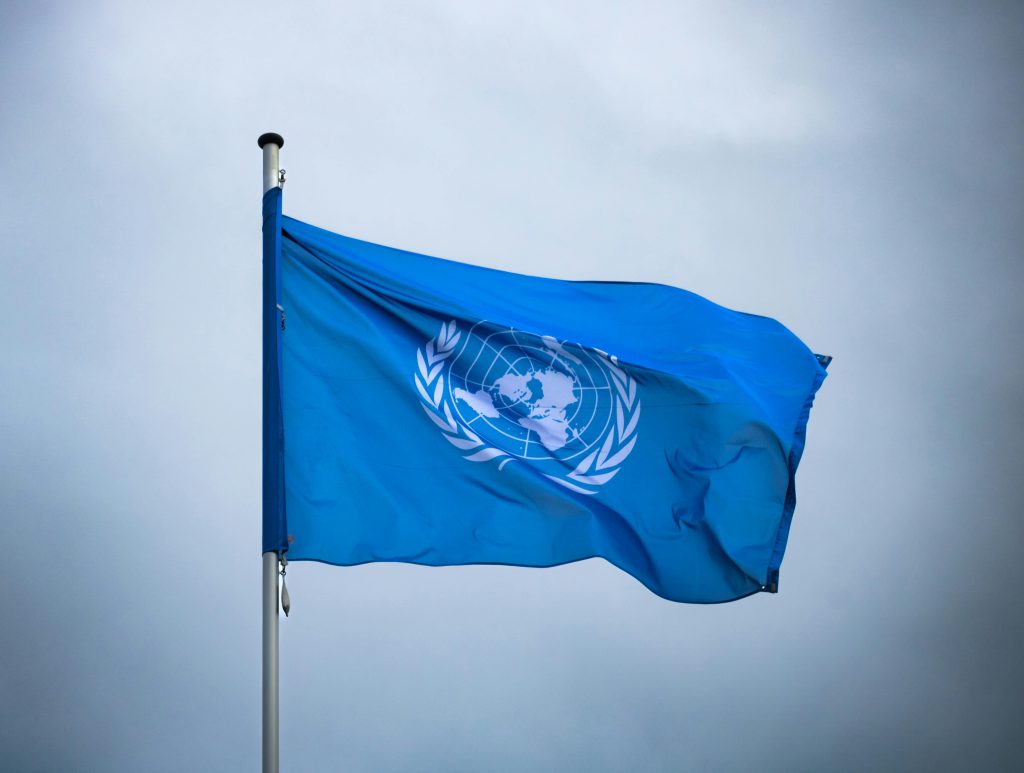
On March 18, 2025, Sahiyo, in collaboration with the Asian Women’s Shelter and Silence Speaks, will host a parallel event at the 69th Session of the Commission on the Status of Women (CSW69) in New York City (NYC). The Commission on the Status of Women (CSW) is a global body committed to the protection, advancement, and empowerment of women. Launched in 1941, CSW seeks to highlight the lives of women and girls around the world and find solutions to the problems that face them, such as poverty, education, the gender pay gap, and violence. This year’s commission will take place from March 10 to 21, 2025 in NYC. Sahiyo’s event, “Storytelling as a Tool for Female Genital Mutilation/ Cutting (FGM/C) Survivor-Centered Change,” will feature a selection of compelling stories from our Voices to End FGM/C program showcasing the resilience and courage of survivors. We will explore our storytelling approach and its effectiveness in advocacy and support for survivors of FGM/C, providing insights into how these narratives have been utilized to drive systemic change and enhance culturally competent care. The Voices alumni attending this event are Leena Khandwala, Saza Faradilla, Dena Igusti, and Zehra Patwa. Additionally, there will be a panel discussion with Voices alum to allow the storytellers to discuss how their stories have supported and uplifted their work, their conversations on FGM/C, and benefited their healing as survivors themselves. The storytellers will also discuss how their stories have been used to further impact in the overall movement to end FGM/C. The event will be moderated by Mariya Taher, Executive Director and Co-founder of Sahiyo, and Su Young, Associate Director of Asian Women’s Shelter. We look forward to connecting with individuals dedicated to ending FGM/C and those eager to learn more about this critical issue. Event Details: Date: Tue, 18 March, 2025 Time: 12:30 pm – 2:00 pm ET Location: Church Center for the United Nations (CCUN), 2nd Floor, 777 United Nations Plaza, New York, NY 10017 Registration: https://bit.ly/SahiyoCSW69
Supporting Survivors in the LGBTQIA+ Community: How Sahiyo Helped Afiqa Attend the ASEAN Queer Leadership Week

In October 2024 I participated in the ASEAN Queer Leadership Week (AQLW), in Bangkok, Thailand, organized by the ASEAN SOGIE Caucus. I represented the End FGC Singapore campaign and was awarded the Sahiyo Advocacy Travel Scholarship in 2024, which supported my participation in the program. The leadership program was aimed at building the capacities of LGBTQIA+ activists in promoting the human rights of all, no matter their sexual orientation, gender identity, gender expression, and sex characteristics (SOGIESC) in broader society. We learned how to respond to the needs of the LGBTQIA+ movement within our spheres of influence. It was the ASEAN SOGIE Caucuses first cycle involving queer activists who work outside of LGBTQIA+ spaces. The program participants hailed from nine Southeast Asian countries: Thailand, Laos, Myanmar (Burma), Cambodia, the Philippines, Malaysia, Indonesia, Brunei Darussalam, and Singapore. They were activists advocating on behalf of the rights of the disabled, labor rights, education for rural children, animal rights, climate justice and sustainability, journalism, and refugee and migrant rights. Of course, the issue of FGM/C falls under sexual and reproductive health rights (SRHR), gender-based violence (GBV), and children’s rights. I wanted to strengthen my advocacy work in the anti-FGM/C movements by connecting and building solidarity with regional activists. I wanted to spread the word about the impact of FGM/C, its pervasiveness in our region, and how it is connected to LGBTQIA+ issues. According to Sahiyo’s research on intersectionality titled “Examining Intersections Between Female Genital Mutilation/Cutting and Social Oppressions” (February 2024), barriers to ending FGM/C are impacted by social oppressions such as racism, xenophobia, Islamophobia, hostilities against disabilities and neurodivergencies, and anti-LGBTQIA. With these threads of oppression interwoven, FGM/C survivors such as myself cannot separate them from our survivorship. At 18, I learned that my cut was a human rights violation at a feminist-led comprehensive sexuality education workshop. I asked my mother, who readily confirmed that under her instructions, my older sister had brought me to a Muslim woman doctor at a private clinic to have the prepuce (or the clitoral hood) of my genitals nicked. My cut is classified as type 1b FGM/C according to the World Health Organisation categories. My mother reasoned that cutting helps control the female libido (it doesn’t). This belief assumes that the vulva-owning baby will grow up to be a straight, cisgender woman, leaving little room for queer and trans acceptance. As a result, I created a digital story as part of the Voices to End FGM/C Digital Storytelling project in the spring of 2022. Voices to End FGM/C is a joint digital storytelling project initiated by Sahiyo and Silence Speaks. I collaborated with illustrator and former Sahiyo Programs Coordinator Catherine Cox, who helped me visualize some intimate parts of my story. Subsequently, I reflected on the ongoing process of creating and honoring one’s story. I joined the Singapore campaign due to the lack of trans and non-binary survivor voices in the global anti-FGM/C movements. Trans and non-binary survivors of FGM/C are excluded from the global survivorship data. For example, a female respondent is described as a woman without explicit agreement on their gender identity. This exclusion means that many trans and non-binary survivors are not aware that they were affected or do not have the space to share how FGM/C uniquely affects them. That is what the program participants and I have in common – that our lived experiences and perspectives as queer and trans people are often left to the margins and not centered within the causes that intimately affect us. We discussed the impact of being constantly exposed to hostilities and vicarious trauma due to our advocacy work. Starting with assessing our state of mental health, we drew up personal safety plans to communicate our needs to the people around us so that we don’t feel alone in our advocacy. Activism can be a tricky space to be in. As we talk about these issues, we may experience them concurrently. On top of that, queer folks face an added layer of vulnerability. Sharing personal stories may open up old wounds, which contends with wanting to stay professional and level-headed. How do we balance advocating for urgent issues while maintaining some semblance of sanity and protecting our well-being? We opened up about our vulnerabilities and the relentless hostilities, as well as holding on to hope. We allowed ourselves to reimagine multiple futures that left no one behind. To achieve the progress and success we Singaporeans enjoy today, we needed to leave some people behind – even at the expense of our people and neighbors. That perspective is reflected in how we treat most issues today, including FGM/C. The reason we advocate is that we want to be treated with dignity and believe that everyone deserves to be treated as such. It is an honor and a privilege to help my community in shifting our culture to one that chooses love over fear. I trust that in time we won’t leave anyone behind and that includes trans and non-binary children and survivors of FGM/C. About the Author: Afiqa (she/they) is a non-binary survivor of FGM/C from the Malay Muslim community in Singapore. They are a founding member of the End FGC Singapore campaign and a member of the Asia Network to End FGM/C. Recently, Afiqa joined the Non-Binary Southeast Asia collective. [youtube url=”https://youtu.be/nX2wIp0_OtY?feature=shared”]
Uniting to End FGM/C Across the Americas: A Joint Statement

This February 6th – International Day of Zero Tolerance for Female Genital Mutilation/Cutting, in recognition of this year’s theme – “Stepping Up the Pace. Strengthening Alliances and Building Movements to End FGM,” we are delighted to announce the formation of the Americas Alliance to End FGM/C. The Americas Alliance will serve as a coalition of organizations, governments, researchers, activists, and survivor advocacy groups, dedicated to ending female genital mutilation/cutting (FGM/C) across the Americas. Recognizing FGM/C as a severe violation of human rights and a form of gender-based violence (GBV), the Alliance aims to unify efforts to support survivors, enhance prevention strategies, and promote gender equality throughout the region. FGM/C impacts communities worldwide, including across North and South America, though misconceptions lead to falsely believing the Americas are immune from this form of gender-based violence. The latest data shows us that there may be over 700,000 women and girls across the United States and Canada affected by or at risk of FGM/C. FGM/C also continues to be reported in Colombia, where a bill has recently been introduced to combat the harmful practice. There is also historical evidence of FGM/C being practiced in Mexico, Brazil and Peru which requires further investigation to determine current practice. From survivors living with its physical and psychological consequences to girls at risk, FGM/C transcends borders and cultures, demanding a unified, coordinated, and survivor-centered response. 1 Recognizing this need, we are proud to support the creation of the Americas Alliance —a collaborative network dedicated to addressing FGM/C through cross-border cooperation, shared knowledge and resources, and survivor-informed approaches. By bringing diverse voices and expertise together, the Americas Alliance aims to build capacity, amplify advocacy, and create lasting change. Participants: The founding organizations of the Americas Alliance include The U.S. End FGM/C Network, the End FGM Canada Network, George Washington University, Equality Now, and Sahiyo U.S. The Americas Alliance will also involve additional diverse groups of stakeholders dedicated to ending FGM/C and supporting survivors across the Americas. The partners whom the Alliance will collaborate and engage with will include: Service-providing organizationsExamples: Grassroots NGOs, community health organizations, and social service providers working directly with FGM/C survivors. Government representativesExamples: Government and intergovernmental development agencies and departments. ResearchersExamples: Academic institutions, public health researchers, gender studies scholars, and independent experts focused on FGM/C. ActivistsExamples: Survivor-led advocacy groups, grassroots organizers, human rights defenders, and gender justice advocates. And moreExamples: International organizations, private sector partners, legal advocates, faith-based organizations. Our Shared Commitment As participants of the Americas Alliance, we are dedicated to: Enhance data collection and knowledge sharing by establishing a robust framework for collecting and sharing data across countries, improving the accuracy of FGM/C prevalence estimates, and understanding its impact throughout the Americas. Develop trauma-informed, culturally sensitive support systems by facilitating the creation of transnational support networks that are responsive to the cultural and holistic health needs of survivors. Strengthen prevention strategies and policy frameworks by promoting the exchange of best practices and successful prevention models from diverse contexts within the Americas. Coordinate consistent, survivor-centered communications by ensuring that messaging and communications around FGM/C align across the region, maintaining accuracy, and respect for the lived experiences of survivors. If you wish to learn more about the Americas Alliance to End FGM/C, please contact us at americasalliance@endfgmnetwork.org. 1 Efforts are aligned with key Sustainable Development Goals (SDGs), including SDG 3 (Good Health and Well-being), SDG 5 (Gender Equality), and SDG 17 (Global Partnerships).
Sahiyo research uplifts how intersectionality impacts the movement to end FGM/C this February 6th
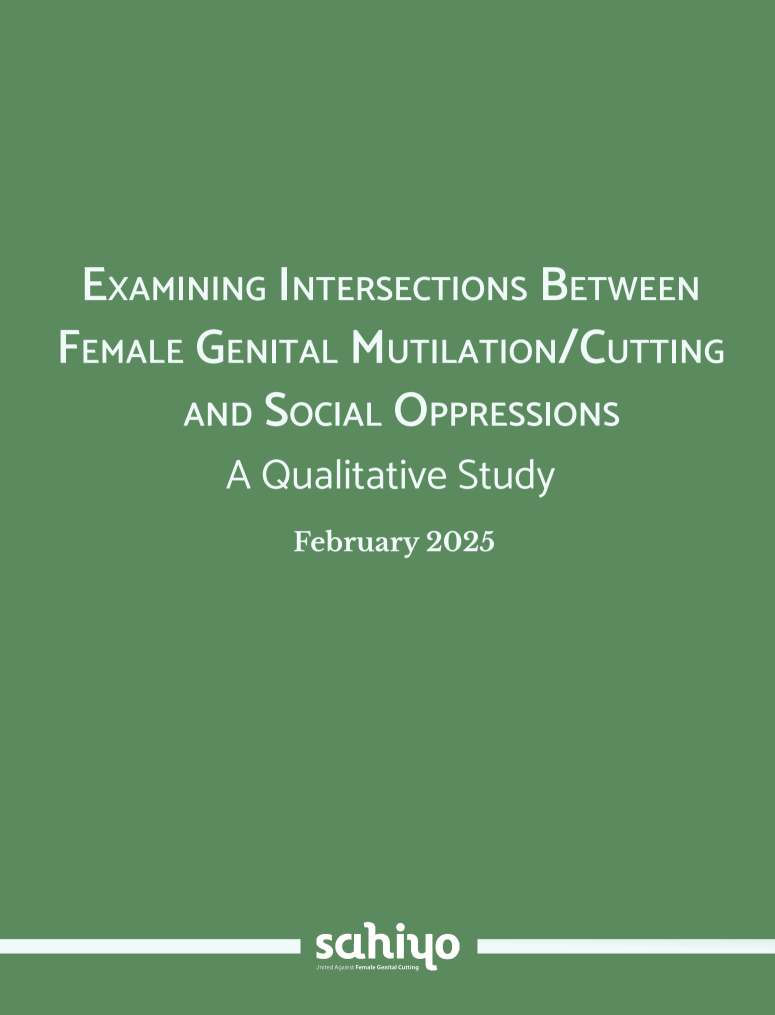
In recognition of Feb 6th, International Day of Zero Tolerance to End FGM/C, and this year’s theme “Stepping up the Pace: Strengthening Alliances and Building Movements to End FGM,” our upcoming publication of Sahiyo’s third and final Critical Intersections Research Project report Examining Intersections Between Female Genital Mutilation/Cutting and Social Oppressions: A Qualitative Study could not be more timely. Our report’s findings reinforce the vital importance of recognizing intersectional identities and oppressions, as well as prioritizing the need to build cross-movement collaboration to strengthen the movement to end FGM/C. Overall, our research reveals through extensive data and testimonials that we are stronger when we work together, contrasting the harmful and discriminatory rhetoric coming from the Trump Administration. Expanding on the findings of our first two reports, this body of work includes insights derived from in-depth interviews conducted with 29 key experts across various social justice fields. The interviews were conducted across multiple geographic regions virtually via Zoom from November 2022 to February 2023. Two clear themes emerged: Intersectionality and Cross Collaboration. The report addresses the following topics within these two themes: Intersections between FGM/C and Race, LGBTQIA+, Religion, and Gender. Challenges and Opportunities to Cross Collaboration. From these findings, four recommendations were derived to address FGM/C: Coordinate with social service sectors across various social justice issues to improve support and resources for survivors. Improve language and framing of FGM/C to limit racialization and/or exclusion of marginalized communities in terms of who is impacted by FGM/C. Increase education on how FGM/C is intersectional within anti-FGM/C organizations, as well as across different movements/sectors. Implement more diverse and equitable approaches to data collection, analysis and dissemination that include input from a diverse array of stakeholders. Don’t miss our webinar, Intersectional Approaches Strengthen Alliances and Build Movements to End FGM/C, to learn more about the three-year project. Date/Time: February 27 @ 10-11:30 AM ET Registration link: https://bit.ly/FGMCAlliances Description: This webinar, which is both a culmination of the Critical Intersections Research Project and a charted path forward, will loop in key players from throughout the project to share their experiences and explore key findings that emphasize how intersectional approaches in ending FGM/C, including building alliances and partnerships with other social justice movements, strengthens our overall work to end FGM/C. Speakers: Aarefa Johari is a journalist and feminist activist based in Mumbai, India. She has been advocating for an end to Female Genital Cutting since 2012 and is a co-founder of Sahiyo, an organisation working to end FGC. Saza Faradilla (she/they) is a co-founder of End Female Genital Cutting Singapore, which envisions a world where the practice of FGC is obsolete. She raises awareness on social media and on-the-ground, and participates in local and international lobbying at the United Nations to bring attention to the fact that FGC is a pressing concern in Asia. Equally important, she calls for a culturally-contextual and intersectional feminist approach when dealing with sexual and gender based violence across diverse Asian communities. Jessica Puri is an Adjunct Professor of Public Health and founder of The Parable Lab. Nicknamed a Creative Academic, she enjoys the pursuit of knowledge and rest through creative expression and storytelling. Naquia Unwala is currently a medical student at Georgetown University School of Medicine. She is also a Research Associate at Cornell University where she studies homelessness, public health disasters, and urban politics. Naquia is a volunteer at Sahiyo, and has helped with leading qualitative analysis of the Critical Intersections Research Project. Critical Intersections: Since 2021, through our survivor and advocate-led Critical Intersections Research Project, Sahiyo has sought to understand how systems of oppression have delayed progress toward ending female genital mutilation/cutting (FGM/C), as well as explored the potential to build collaboration with other social justice movements to increase advocacy work on ending FGM/C. Inspired by a webinar in 2021 that sought to specifically examine the impact of systemic racism on the movement, this three-stage mixed-methods project has expanded that initial scope to understand the interplay between FGM/C and other oppressive forces such as Islamaphobia, xenophobia, transphobia, gender discrimination, and more. A special thank you to the Wallace Global Fund for funding this project!
Calling CT Residents to Action – Ban FGM/C in Connecticut

Connecticut legislatures have recently introduced House Bill 6596 to protect girls and women from female genital mutilation/cutting (FGM/C). Connecticut is one of only nine states without legislation protecting children from FGM/C. FGM/C is a human rights violation and an extreme form of gender-based violence which causes severe physical and psychological damage. The introduction of this bill is a result of countless hours of advocacy from survivors and activists alike. The work, however, is not done! Connecticut has not yet made it clear that FGM/C is an intolerable criminal offense in the state. Right now, in Connecticut alone, at least 2,658 women and girls have been subjected to or are at-risk of undergoing FGM/C. Surrounding states, such as New York and Massachusetts, have already banned FGM/C, potentially making Connecticut a refuge for those seeking to continue the harmful practice. It is up to the residents of Connecticut to demand that their state legislators prioritize the passage of this bill – which also would seek to create community education and outreach programs to address the human rights violations in the broader public. Want to help us make Connecticut the 42nd state to protect women and girls from FGM/C by encouraging and supporting the passing of this bill? Sign our Call to Action and urge your state representatives to ban FGM/C. All you need to do is fill out your contact info and then hit send. The rest (what is in brackets) will automatically be filled out for you and sent to your legislator. Thank you for your support!
